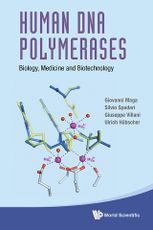
Human DNA Polymerases: Biology, Medicine and Biotechnology
Authors : Giovanni Maga (Institute of Molecular Genetics IGM-CNR, Italy), Silvio Spadari (Institute of Molecular Genetics IGM-CNR, Italy), Giuseppe Villani (CNRS-Paul Sabatier University, France), Ulrich Hübscher (University of Zürich, Switzerland)
Publisher : World Scientific
ISBN : 978-981-3226-40-1
There are currently no reviews for this book title.
Maintenance of the information embedded in the genomic DNA sequence is essential for life. DNA polymerases play pivotal roles in the complex processes that maintain genetic integrity. Besides their tasks in vivo, DNA polymerases are the workhorses in numerous biotechnology applications such as the polymerase chain reaction (PCR), cDNA cloning, next generation sequencing, nucleic acids based diagnostics and in techniques to analyze ancient and otherwise damaged DNA (e.g. for forensic applications). Moreover, some diseases are related to DNA polymerase defects and chemotherapy through inhibition of DNA polymerases is used to fight HIV, Herpes and Hepatitis B and C infections. This book focuses on (i) biology of DNA polymerases, (ii) medical aspects of DNA polymerases and (iii) biotechnological applications of DNA polymerases. It is intended for a wide audience from basic scientists, to diagnostic laboratories, to companies and to clinicians, who seek a better understanding and the practical use of these fascinating enzymes.
Dr Giovanni Maga is Senior Researcher and Head of the DNA Enzymology & Molecular Virology Unit at the Institute of Molecular Genetics IGM-CNR in Pavia, Italy, Contract Professor in Molecular Biology at the University of Pavia, Italy and member of the College of Supervisors of the PhD Programme in Genetics, Molecular and Cellular Biology at the University of Pavia, Italy.
He has been working since his graduation on the enzymology of genome duplication and repair. His research has focused on the characterization of different enzymatic systems responsible for nucleotide metabolism and the duplication of the genetic information in human cells and viruses as well as in protozoa parasites. He is also interested in the biochemical pathways involved in coupling the DNA replication and repair machineries to cell cycle regulation in normal vs. tumoral human cells. His interest is devoted both towards the elucidation of basic molecular processes and to the exploitation of novel enzymatic targets for antiviral and anticancer chemotherapy.
Presently his main lines of research are the following:
Enzymology of genome replication and repair in eukaryotic cells and viruses;
Novel targets and drugs for antiviral and anticancer chemotherapy.
Since 1990, Dr Maga is author/co-author of 240 publications in international peer-reviewed journals (Web of Science), which obtained 9,212 citations. His H-index is 49 (Google Scholar) as at May 2017.
Silvio Spadari was born in Italy in 1939 and obtained his PhD degree in Chemistry (1963), in Pharmacy (1968) and later a Medical Degree (1987) and a Specialization in Clinical Biology (1991) at the University of Pavia, Italy. In 1971 he was hired by the Institute of Molecular Genetics, National Research Council in Pavia where in 1983 he founded the section of "DNA Enzymology and Molecular Virology", which he has directed until 2006.
During his career he was Research Associate at the Department of Biochemistry, University of Iowa, USA (1963–1965), Visiting Scientist at the Department of Cell Biology, Roche Institute of Molecular Biology, Nutley, NJ, USA (1973–1975), Visiting Professor, for several periods of time from 1976 up to 2000, at the Department of Molecular Biology, Université Libre de Bruxelles, Belgium, at the Department of Molecular Biology, University of Hamburg, Germany, and at the Department of Pharmacology and Biochemistry, University of Zurich, Switzerland.
He was Editorial Board Member of Nucleic Acids Research (1986–1994), In Vivo (1987–2001), Mutation Research: Genetic Instability and Aging (1989–1993), Editorial Adviser of the Biochemical Journal (1981–2011), Official Reviewer of the Division of Physiology, Cellular and Molecular Biology, National Science Foundation, Washington, DC, USA (1978–2000).
He is co-author of over 200 publications in international journals or books and his main research interests were as follows:
Enzymology of DNA replication in eukaryotic cells and eukaryotic viruses (HSV-1, HSV-2, HIV and HCV). Among enzymes studied: human and herpesvirus DNA polymerases, HIV reverse transcriptase, HCV RNA polymerase and Helicase, DNA ligases, DNA topoisomerases, thymidine kinases, uracil-DNA glycosylases, dUTPases, thymidine phosphorylase, thymidylate synthase, etc.;
Replicative strategies of human viruses (HSV,HIV,HCV);
Development of novel anti-HSV, anti-HIV and anti-HCV compounds (nucleosides or non-nucleosides analogs);
Control of herpes simplex virus latency and reactivation;
Molecular basis for antiviral drug-resistance.
Giuseppe Villani was born in Italy in 1949 and obtained his Master's Degree in Biochemistry in 1973 at the University of Pavia, Italy under the supervision of Prof. Arturo Falaschi. From 1974 to 1978, he did his PhD at the Free University of Brussels, Belgium, working on the role of DNA polymerases in induced mutagenesis, under the supervision of Prof. Miroslav Radman. He then spent a postdoctoral period (1978–1980) at the Department of Biochemistry of the Stanford University, USA, in the group of Prof. Robert Lehman, where he studied the mechanisms of DNA replication in Drosophila melanogaster. Subsequently he moved to France, and became Assistant Professor of Toxicology at the University of Toulouse. In 1982, he was hired as Researcher at the French National Institute of Medical Research (INSERM), where he was promoted to the position of Research Director in 1995. He directed a group of researchers at the University of Toulouse until his retirement in 2015.
The main interest of Dr. Villani's entire scientific career was to investigate the molecular mechanisms underlying the action of DNA polymerases, with a particular emphasis on their role in replication of damaged DNA.
He is co-author of 95 articles in international journals and was Editor of the Journal of Biological Chemistry from 2002 to 2012.
Ulrich Hübscher studied Veterinary Medicine in Fribourg, Bern, and Zürich in Switzerland and subsequently did postgraduate studies in Biochemistry and Molecular Biology in Zurich. After postdoc years in the laboratories of Arthur Kornberg (Stanford) and Robin Holliday (Mill Hill, London), he started his own work in Zurich since 1981, where he became Professor in 1989. He devoted his scientific research over the last 40 years on functions of DNA polymerases. In over 300 publications he contributed to biological functions of different DNA polymerases from Escherichia Coli, Deinococcus radiodurans, HIV and FIV viruses (RT) and eukaryotes (animals and human DNA polymerases α, β, γ, δ, ε, and λ) and their auxiliary proteins such as replication protein A, replication factor C, and proliferating cell nuclear antigen. He is a member of the Swiss Academy of Medical Sciences.
He has been working since his graduation on the enzymology of genome duplication and repair. His research has focused on the characterization of different enzymatic systems responsible for nucleotide metabolism and the duplication of the genetic information in human cells and viruses as well as in protozoa parasites. He is also interested in the biochemical pathways involved in coupling the DNA replication and repair machineries to cell cycle regulation in normal vs. tumoral human cells. His interest is devoted both towards the elucidation of basic molecular processes and to the exploitation of novel enzymatic targets for antiviral and anticancer chemotherapy.
Presently his main lines of research are the following:
Enzymology of genome replication and repair in eukaryotic cells and viruses;
Novel targets and drugs for antiviral and anticancer chemotherapy.
Since 1990, Dr Maga is author/co-author of 240 publications in international peer-reviewed journals (Web of Science), which obtained 9,212 citations. His H-index is 49 (Google Scholar) as at May 2017.
Silvio Spadari was born in Italy in 1939 and obtained his PhD degree in Chemistry (1963), in Pharmacy (1968) and later a Medical Degree (1987) and a Specialization in Clinical Biology (1991) at the University of Pavia, Italy. In 1971 he was hired by the Institute of Molecular Genetics, National Research Council in Pavia where in 1983 he founded the section of "DNA Enzymology and Molecular Virology", which he has directed until 2006.
During his career he was Research Associate at the Department of Biochemistry, University of Iowa, USA (1963–1965), Visiting Scientist at the Department of Cell Biology, Roche Institute of Molecular Biology, Nutley, NJ, USA (1973–1975), Visiting Professor, for several periods of time from 1976 up to 2000, at the Department of Molecular Biology, Université Libre de Bruxelles, Belgium, at the Department of Molecular Biology, University of Hamburg, Germany, and at the Department of Pharmacology and Biochemistry, University of Zurich, Switzerland.
He was Editorial Board Member of Nucleic Acids Research (1986–1994), In Vivo (1987–2001), Mutation Research: Genetic Instability and Aging (1989–1993), Editorial Adviser of the Biochemical Journal (1981–2011), Official Reviewer of the Division of Physiology, Cellular and Molecular Biology, National Science Foundation, Washington, DC, USA (1978–2000).
He is co-author of over 200 publications in international journals or books and his main research interests were as follows:
Enzymology of DNA replication in eukaryotic cells and eukaryotic viruses (HSV-1, HSV-2, HIV and HCV). Among enzymes studied: human and herpesvirus DNA polymerases, HIV reverse transcriptase, HCV RNA polymerase and Helicase, DNA ligases, DNA topoisomerases, thymidine kinases, uracil-DNA glycosylases, dUTPases, thymidine phosphorylase, thymidylate synthase, etc.;
Replicative strategies of human viruses (HSV,HIV,HCV);
Development of novel anti-HSV, anti-HIV and anti-HCV compounds (nucleosides or non-nucleosides analogs);
Control of herpes simplex virus latency and reactivation;
Molecular basis for antiviral drug-resistance.
Giuseppe Villani was born in Italy in 1949 and obtained his Master's Degree in Biochemistry in 1973 at the University of Pavia, Italy under the supervision of Prof. Arturo Falaschi. From 1974 to 1978, he did his PhD at the Free University of Brussels, Belgium, working on the role of DNA polymerases in induced mutagenesis, under the supervision of Prof. Miroslav Radman. He then spent a postdoctoral period (1978–1980) at the Department of Biochemistry of the Stanford University, USA, in the group of Prof. Robert Lehman, where he studied the mechanisms of DNA replication in Drosophila melanogaster. Subsequently he moved to France, and became Assistant Professor of Toxicology at the University of Toulouse. In 1982, he was hired as Researcher at the French National Institute of Medical Research (INSERM), where he was promoted to the position of Research Director in 1995. He directed a group of researchers at the University of Toulouse until his retirement in 2015.
The main interest of Dr. Villani's entire scientific career was to investigate the molecular mechanisms underlying the action of DNA polymerases, with a particular emphasis on their role in replication of damaged DNA.
He is co-author of 95 articles in international journals and was Editor of the Journal of Biological Chemistry from 2002 to 2012.
Ulrich Hübscher studied Veterinary Medicine in Fribourg, Bern, and Zürich in Switzerland and subsequently did postgraduate studies in Biochemistry and Molecular Biology in Zurich. After postdoc years in the laboratories of Arthur Kornberg (Stanford) and Robin Holliday (Mill Hill, London), he started his own work in Zurich since 1981, where he became Professor in 1989. He devoted his scientific research over the last 40 years on functions of DNA polymerases. In over 300 publications he contributed to biological functions of different DNA polymerases from Escherichia Coli, Deinococcus radiodurans, HIV and FIV viruses (RT) and eukaryotes (animals and human DNA polymerases α, β, γ, δ, ε, and λ) and their auxiliary proteins such as replication protein A, replication factor C, and proliferating cell nuclear antigen. He is a member of the Swiss Academy of Medical Sciences.
There are currently no reviews for this book title.
Buy this book, http://www.worldscientific.com/worldscibooks/10.1142/10609, 9655, false
FAQs
Click on the "Buy this book" button
You can email us at book-review@enago.com and we will get back to you with the next steps shortly.
New Releases
-

Advances in the Molecular Understanding of Colorectal Cancer
-

Basic Research and Industrial Innovation in China
-

Constable & Lim Colour Atlas Of Ophthalmology: Sixth Edition
-

Essentials of Ophthalmology: For Medical School and Beyond
-

Fixed Revenue Accounting: A New Management Accounting Framework
All featured publishers and authors can avail of a free promotional interview on Enago Academy! Write to us now!
